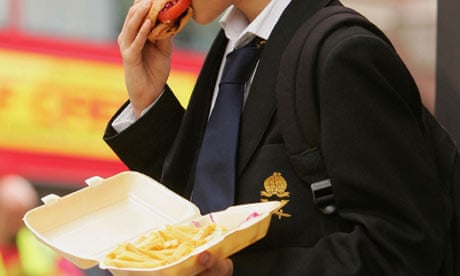The government should ban the use of manufactured trans fats from all foods sold in the UK, a move that could save thousands of lives a year, doctors say.
Trans fats, which are used in the manufacture of deep-fried food, margarine and baked goods such as cakes and biscuits, are a big risk factor for heart disease.
Even a tiny reduction in the amount of food energy they represent in an average person's diet would have huge health benefits, two doctors from Harvard Medical School claim.
"A strategy to reduce consumption of industrial trans fatty acids (TFAs) by even 1% of total energy intake would be predicted to prevent 11,000 heart attacks and 7,000 deaths annually in England alone," according to Dariush Mozzaffarian and Meir J Stamper, writing in the British Medical Journal.
Denmark and New York City have each almost eradicated trans fats in foods sold locally. The BMJ writers say this was done without affecting the price, taste or availability of products. "Removing industrial TFAs is one of the most straightforward public health strategies for rapid improvements in health," they say.
Some trans fats occur naturally in meat and milk but most are consumed in everyday manufactured foods. They are "associated with a substantial risk of heart disease events", a "risk far higher per calories consumed than for any other dietary macronutrient, including saturated fat", the article states.
The writers' plea adds to growing calls from doctors and medical charities for a trans fats ban. The UK Faculty of Public Health, which represents local councils, academia, and 3,300 doctors in the NHS, recently demanded ministers outlawed trans fats altogether.
Steve George, the faculty's vice-president, said the BMJ editorial underlined the case for action. "Trans fats aren't like products such as cigarettes or alcohol – no one goes out to buy trans fats. They are in there because they increase manufacturers' profits, not because they improve taste or are desirable in any way." He said the UK should follow the lead of places that had banned them.
But the food industry accused the authors of scaremongering. Barbara Gallani, director of food safety and science at the Food and Drink Federation, claimed the report created "an unbalanced picture" because it did not include data on typical intake of trans fats. "Artificial trans fats have been virtually eliminated from processed foods in the UK, due to a significant focus on reformulation by UK food manufacturers," she said.
The Department of Health ruled out action. A spokeswoman said trans fats now accounted for just 0.8% of a typical Briton's daily food, below the 2% maximum recommended by the government's advisers, the Scientific Committee on Nutrition. That intake meant "the government concluded that trans fats at these levels do not pose health risks to consumers".
Campaigners in Scotland recently failed to persuade the Scottish parliament to back a trans fats ban.
Victoria Taylor, senior heart health dietician with the British Heart Foundation, said "significant" voluntary reductions in trans fats by the food industry had led to "good progress". But she added: "We still need to do more to make sure that industrially produced trans fats don't creep back into our nation's diets."
The levels should be monitored, and food manufacturers given targets, she said.
